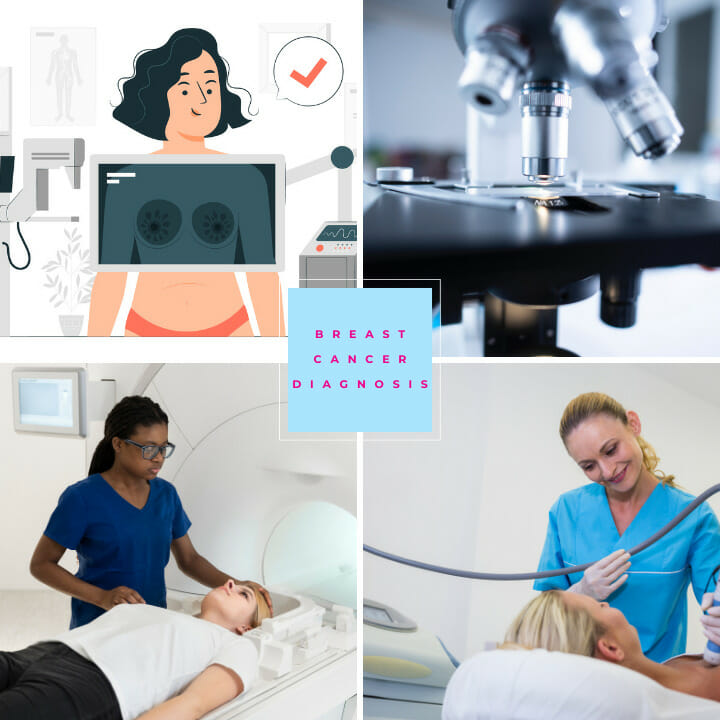CallBack
Request
Leave your contact details and we will get in touch with you as soon as possible.
Exploring the Different Types of Breast Cancer Diagnosis Methods
Breast cancer diagnosis involves various methods, including breast cancer screening tests such as mammograms, clinical breast exams, and self-exams. These tests help detect any abnormalities or signs of cancer in the breasts. Timely diagnosis allows for early intervention and treatment, which can significantly impact a patient's prognosis.

The importance of accurate breast cancer diagnosis cannot be overstated. It not only helps identify the presence of cancer but also determines the stage and type of breast cancer present. This information is vital for developing an appropriate treatment plan tailored to each individual's needs.
Furthermore, accurate diagnosis plays a pivotal role in raising awareness about breast cancer among women. It encourages them to prioritize regular screenings and self-exams, promoting early detection and proactive healthcare practices.
In this section, we will explore the various methods used in breast cancer diagnosis, their significance in early detection efforts, and how accurate diagnoses contribute to overall breast cancer awareness initiatives. By understanding these aspects, we can better appreciate the critical role that accurate diagnosis plays in improving outcomes for individuals affected by this disease.
Mammogram
Mammogram, also known as mammography, is widely recognized as the gold standard for breast cancer screening. This specialized imaging test plays a crucial role in detecting breast abnormalities and identifying potential signs of breast cancer at an early stage.
Ultrasound
Ultrasound has emerged as a versatile diagnostic tool for evaluating breast abnormalities. A breast ultrasound scan, also known as ultrasound imaging, utilizes sound waves to create detailed images of the breast tissue. This non-invasive procedure offers several advantages in the diagnosis of breast cancer compared to traditional methods such as mammograms.
MRI (Magnetic Resonance Imaging)
MRI (Magnetic Resonance Imaging) has emerged as a powerful tool in the detection and evaluation of breast cancer. While mammograms and ultrasounds have been traditionally used for breast cancer screening, MRI offers several advantages in breast imaging.
Biopsy
Biopsy plays a crucial role in confirming a diagnosis through tissue sampling. It is a procedure commonly used to obtain samples of suspicious tissue for further analysis. There are different types of biopsies, with two common ones being core needle biopsy and surgical biopsy.
Blood Tests and Genetic Testing: Assisting in Early Detection and Risk Assessment
Blood tests and genetic testing play a crucial role in assisting with early detection and risk assessment of various health conditions, particularly in the case of breast cancer. Two commonly used blood tests for breast cancer markers are CA 15-3 and CA 27.29. These tests measure the levels of specific proteins in the blood that may indicate the presence of breast cancer or its progression.
Additionally, genetic testing is an essential tool for assessing the risk of developing breast cancer. One specific gene mutation that is often tested for is BRCA (Breast Cancer gene) mutations. BRCA1 and BRCA2 mutations are known to significantly increase the risk of developing breast and ovarian cancers.
By analyzing an individual's DNA, genetic testing can identify these mutations, allowing healthcare professionals to provide appropriate preventative measures and personalized treatment plans. Early detection through regular blood tests and genetic testing enables individuals to take proactive steps towards managing their health risks, seeking timely medical intervention, and making informed decisions about preventive measures such as increased surveillance or even prophylactic surgeries when necessary.
It is important to note that these tests are not definitive diagnoses but rather tools that aid in risk assessment. They should always be interpreted by qualified healthcare professionals who can provide accurate guidance based on individual circumstances.
Note: Please consult a medical professional or specialist for accurate information about breast cancer diagnosis methods.
